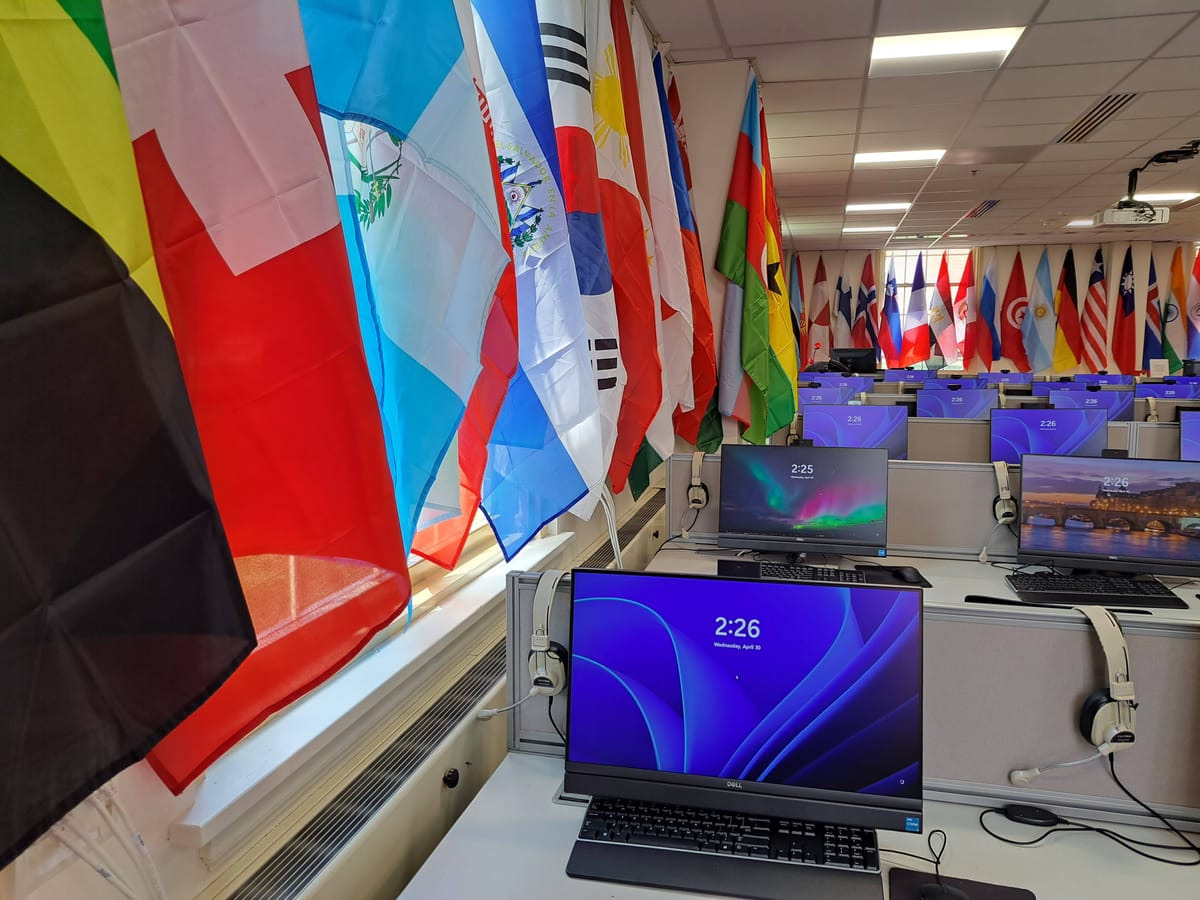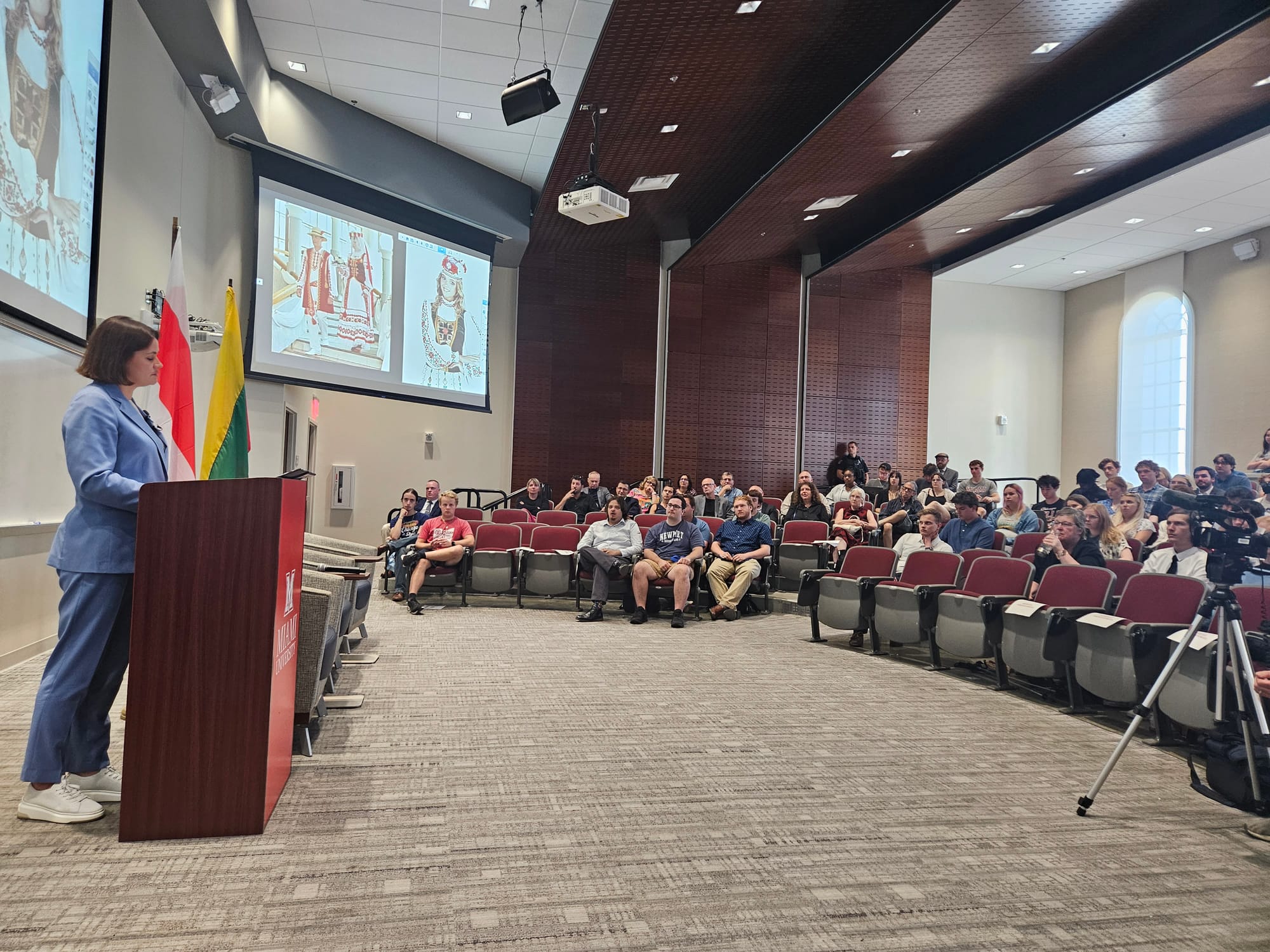As Miami proposes new structure for language programs, educators worry about priorities
As language program enrollment declines nationally, Miami University is considering rolling six separate language majors under a united degree program. Despite this, language proficiency is essential for employers and national security.

William King has spent the last few years of his life in Georgia. The country, not the state.
In 2011, King graduated from Miami University with a double major in international studies and Russian, East European and Eurasian studies (RUS). A decade later, he’s still putting those majors to work as he completes his Ph.D. in history at the University of California in Berkeley.
King is conducting archival research on how the Soviet Union interacted with Turkey in majority Muslim borderlands in Georgia while both countries modernized in the 20th century. He initially planned to spend most of his time researching from Russia — until the Russian invasion of Ukraine in 2022.
“I had never intended to stay in Georgia for so long,” King says, “... but because of the war in Ukraine and the political fallout from that, going to Russia was no longer a possibility.”
King ended up meeting his wife abroad and says his research has shifted his own interest to a more regional focus. Once he earns his Ph.D., he hopes to work in academia.
More than a decade after graduating, King still uses what he learned at Miami on a daily basis, including his knowledge of the Russian language.
If he were to apply to be an undergraduate at the university today, one of his programs would no longer exist.
The humanities and language at Miami
At an April 21 University Senate meeting, the chairs of two of Miami’s language departments proposed a new major: world languages and cultures.
The move came after Miami notified faculty in programs with less than 35 enrolled majors that they needed to adapt or face elimination just before the start of the Fall 2023 semester. The new world languages and cultures program will replace six undergraduate language programs in the German, Russian, Asian and Middle Eastern Languages and Cultures (GRAMELEC) department and the French, Italian and Classical Studies department if approved by the Board of Trustees and the state.
“We had to really rethink everything we do from the bottom up,” said French, Italian and Classical Studies Department Chair Elisabeth Hodges during the meeting. “We were really inspired by the model of an integrated language, liberal education model where we were not simply doing the same old thing we had done in our disciplines.”
The six programs which would be replaced by world languages and cultures — Classical Studies, East Asian Languages and Cultures, French, German, Italian Studies and RUS — have a current combined enrollment of 130 majors and more than 200 minors. Roughly 30 courses are being discontinued under the new major, while three new interdisciplinary courses are being created.
The language programs aren’t alone in facing restructuring. Since 2020, a total of 76 degree programs have been eliminated, Provost Elizabeth Mullenix said during a presentation to the Board of Trustees in December 2024. That figure includes nearly 40 undergraduate majors, many of which are in the humanities. The university is required to “teach out” eliminated majors for currently enrolled students but does not accept new students to those degrees.
“What’s happening now is sort of a perfect storm situation,” said Benjamin Sutcliffe, a Miami professor who teaches Russian language instruction. The Covid-19 pandemic has led to students struggling nationally in difficult subjects, including foreign languages. Senate Bill 1, which was signed into law this spring, requires universities to eliminate programs which award fewer than five degrees each year for three years.
And at Miami, the university has raised its minimum class size requirement to 15 students per section and eliminated nearly 1500 individual courses since fall 2020 while introducing less than 400 new ones.
Miami brands itself as a Public Ivy that provides a liberal arts education. When Sutcliffe attended Reed College in Portland, Oregon, he was sometimes the only student enrolled in specific language classes. With state and financial pressures aligned against the type of classes that allow one-on-one attention in low-enrolled courses, Sutcliffe said, that brand is at risk.
“It’s antithetical to the rhetoric of being a liberal arts college with state school prices,” Sutcliffe said. “Even for a university in the Midwest, Miami is pretty darn expensive as a public institution.”
Russian education and the war in Ukraine

When King was a student at Miami, the RUS major was particularly interdisciplinary. Miami’s Havighurst Center for East European, Russian and Eurasian Studies, established in 2000, is one of higher education’s preeminent centers focused on post-Soviet studies.
Beyond instruction in language, politics and history, the center regularly attracts international political and social leaders from Russia and other former Soviet states. On May 7 this year, Ukrainian human rights lawyer and Nobel Laureate Oleksandra Matviichuk will give the annual Havighurst Lecture.
King himself still remembers a visit from Russian activist Maria Gaidar, and he said his colloquium class with professor and Havighurst Center director Stephen Norris was the culminating experience of his time as an undergraduate.
While King studied at Miami, he took classes from three different instructors in the Russian language. The experience in each class was intense, he said, but it prepared him well for graduate school and beyond. He also attended a summer intensive program in Russia and got to visit St. Petersburg, Moscow and parts of Ukraine through other Miami programs.
“These were really just absolutely foundational, transformative experiences for me as someone whose career has focused on this region ever since,” King said. “Miami was just a stellar launching pad for me and a lot of my comrades.”
For Norris, the Havighurst Center’s mission extends beyond the Russian language or individual courses. The center’s guests and programming is widely available to students across disciplines, and cross-listed courses in Soviet history and culture attract students beyond related majors each year.
That’s particularly true following Russia’s full-scale invasion of Ukraine three years ago. Since then, Norris has started teaching a history of Ukraine course which has maxed out its registration each time he’s offered it.
“It’s the rare instance when you’re teaching a history class where everyone understands the stakes and the reason why,” Norris said. “... You could say that about almost any one of the classes that we offer in anthropology, history, Russian in translation, classics, political science … You get this deeper understanding of this absolutely crucial part of the world.”
The Havighurst Center is individually endowed and insulated in some ways from the financial pressures academic departments face. Still, Norris said declining enrollment in Russian language courses could have an impact on the center, especially if the university ultimately decides it’s no longer worth putting resources into Russian language and culture courses.
The Havighurst Center puts resources toward study abroad and summer language programs for RUS students, funds research projects and maintains a graduate fellows program that provides weekly language tutoring. For five of the past six years, the center has had a semifinalist in the Fulbright Program.
“You could look at the stats and say there are only, say, 14 or 15 majors in Russian and East European studies,” Norris said. “But if every year we’re getting Fulbright finalists, Critical Language Fellowship winners, Carnegie Fellowship winners, that’s not bad, right?”
For Sutcliffe, the importance of understanding post-Soviet history and politics makes Russian language instruction all the more necessary today. Russian is one of just 12 languages currently eligible for the Critical Languages Scholarship program.
“Frankly, there is something extremely important, including from a national security perspective, to understanding other cultures, to learning Russian, learning Arabic, learning Chinese, learning Japanese,” Sutcliffe said. “I’m astounded and dumbfounded that while the United States is engaged in basically an intermediary proxy war with Russia, the Russian program has been consolidated at Miami.”
Facing the reality of declining enrollment
Miami’s push to focus on high-enrolled majors has disproportionately impacted humanities, but the university isn’t alone.
West Virginia University eliminated almost 30 academic programs and nearly 150 faculty positions in 2023, including all foreign language graduate degrees. The university now offers just four language minors and no majors.
In Ohio, Bowling Green State University has also created a world languages and cultures major. The university had combined two separate language departments in 2019, but the Board of Trustees didn’t approve the broader major until this February. The department still lists six individual language majors. The department chair did not respond to multiple requests for comment.
Unlike the existing language programs at Miami, the new world languages and cultures degree wouldn’t require students to go beyond the 202-level language instruction required for all students in the College of Arts and Science.
“[World languages] is a pretty widespread concept in terms of a major,” Sutcliffe said. “However, the idea that you can take that major and not have to take foreign language itself, I’m not sure how widespread that idea is. I hope it’s not widespread at all.”
Data from the MLA Language Enrollment Database shows that enrollment in the foreign languages offered at Miami generally peaked in the late 2000s and early 2010s, both nationally and statewide. Enrollment at a national level increased by nearly 50% in 2021 after steep declines in 2020 due to the pandemic, but the bounce back was only 10% at Miami.
The MLA database recorded just 91 course enrollments in Russian in the Fall 2021 semester at Miami. That figure includes non-majors and students enrolled in multiple language instruction courses at once.
As Hodges and Ganeva presented the world languages and cultures major idea at University Senate, they addressed shifting demand. By bringing most language instruction except for Portuguese, Spanish and American Sign Language under one umbrella, Hodges said they would be better positioned to adjust when certain languages see declining enrollment or increased interest.
“We became second majors long ago,” Hodges said. “We’ve already been pairing with biology, psychology, linguistics.” That reality informed the decision to limit the major to 30 to 32 hours of coursework and allow for flexibility in the curriculum.
Student interest in language education may have declined over the past year, but its still a highly desirable skill for employers.
A 2019 report by the American Council on the Teaching of Foreign Languages found that nine in 10 U.S. employers relied on employees who spoke languages other than English, and more than half expected foreign language demand to increase in the next five years. One in every three U.S. employers who depend on foreign languages reported a language skills gap, and a quarter of them have lost business due to a lack of employees with language competencies.
While Spanish is by far the most in-demand language for employers (85% say Spanish-speakers are in-demand), Russian is much higher on the list than its enrollment numbers would suggest. In 2019, only Spanish, Chinese, French, Japanese and German were more in-demand. In 2020, though, Russian was only the 11th most-studied language in college, and enrollments had fallen by almost a quarter — a steeper decline than the national average across languages.
For Sutcliffe, the language discussion is part of a broader cultural shift to deprioritize humanities education in favor of hard skills like computer science and accounting. That shift is at odds with the reality of the job market in the U.S., he said.
“It’s the false idea that the humanities are not practical and that they are not job-oriented,” Sutcliffe said. “That’s actually not true. Employers have said again and again that they’re interested in people who can read and interpret texts, who can do research, who have the sort of critical thought skills that the humanities are particularly good at nurturing in students.”
Impacts beyond languages
The language restructuring proposal follows a number of academic changes at Miami following the low-enrolled major identification in 2023, and it won’t be the last.
Other majors cut in 2023 and 2024 included two Bachelor of Science in physics programs, environmental earth science, social justice studies and several education programs. During a Board of Trustees presentation in February, a slide listed six additional undergraduate programs to be eliminated this semester, plus two masters programs.
Marcia England is chair of the geography department, which currently has two majors: urban and regional planning, and geography and sustainable development. The latter has been targeted for elimination due to low enrollment.
Since 2023, England said she and other faculty have been working on ways to restructure the major and avoid getting rid of it entirely. During a presentation last summer, an administrator highlighted the major as having an important focus on sustainability, and England said they’re leaning into that aspect and hoping to present the changes this semester.
Once the program is approved, it will likely go by a different name without geography in the title, England said.
“I think grief is the only word to describe [the prospect of elimination],” England said. “But we knew we had to move and act quickly so that we weren’t caught flat-footed with any new changes … We mobilized in order to preserve as much as we could of our current major, our current classes.”
Since the geography changes are a restructuring and not a new major entirely, England said they may not end up before the state for approval. New programs like world languages and cultures do require approval from the Board of Trustees and Ohio before being implemented.
Other programs listed as being eliminated this semester during the February Board of Trustees meetings included Bachelors of Arts in religion and art history, Bachelors of Science in health communication, health information technology and public health, a Master of Arts in instructional design and technology, and a Master of Education in transformative education.
Among the 12 peer institutions Miami uses for official comparisons, the school now offers the third least bachelors and associates degrees, ahead of only the University of Massachusetts and Cleveland State University.




